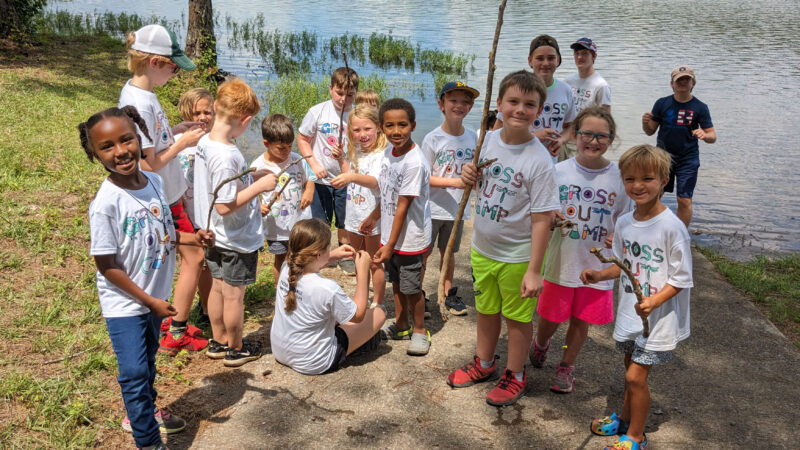Nature-based education on the rise in Alabama
This story is part of a monthly series called Outdoor Connections, which features stories that explore the biodiversity of Alabama and how we depend on it.
A line of kids trek through the woods at Oak Mountain State Park south of Birmingham. As they cross creeks on dirt paths, they keep an eye out for salamanders, owls and poison ivy. They’re making their way to a nearby lake to fish for bream.
“My favorite thing about hiking is that you get to work out your legs,” said Skylar, a six-year-old camper. “And I get to see the view!”
Skylar is one of roughly twenty kids participating in the week-long Gross Out Camp, a summer program hosted at parks and outdoor spaces across Alabama.
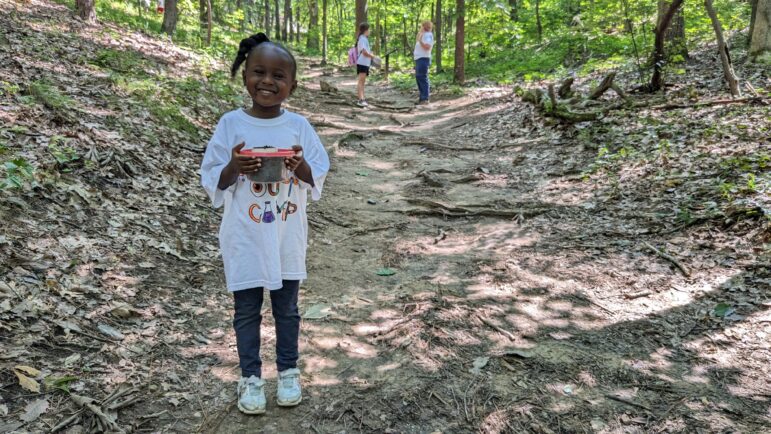
“This is kids’ natural habitat out here in the woods,” said Verna Gates, who started Gross Out Camp 14 years ago. “I mean two of these kids have been begging all day to get in the creek. They love it.”
As schools resume across Alabama, most students are returning to days spent in indoor classrooms, but some will continue to learn and play outside, even while at school. It’s part of a growing movement to teach kids in nature and help them connect with their environment.
Outside, rain or shine
In recent years, at least three nature preschools, or forest schools, have opened across Alabama. They operate almost entirely outside.
“It seems like a very foreign concept, especially when we first described it to people, like ‘Do what? … they’re just gonna be outside all day?’” said Sarah Crim, director of the Woodland Wonders Nature Preschool in Auburn. “[But] it’s great, and it works.”
While a forest school is less academically focused in a traditional sense, Crim said students soak up knowledge from every activity. The class might discover a turtle walking along the forest floor at the Kreher Preserve, where the school is located. That presents an opportunity for students to talk about the animal’s shape and color, and write about their discovery.
“I’m a firm believer you can learn everything through the lens of science and through the lens of nature,” Crim said.
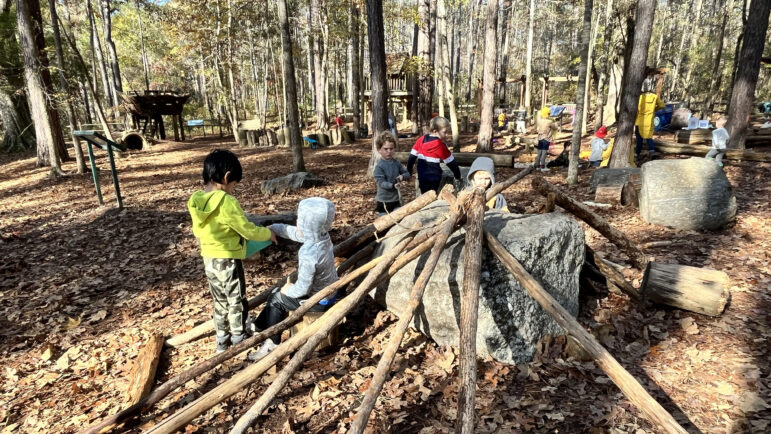
After starting Woodland Wonders in 2019, Crim said word spread quickly. The school has since added classes and programs for older kids, but they can’t keep up with demand. The waitlist exceeds current enrollment.
It’s a similar case at Little Mountain Forest School in Huntsville, where kids learn and play at Monte Sano State Park.
Co-founder and co-director Beth Barry said both kids and parents love the natural space.
“There’s often tears shed, going ‘Oh my goodness, this is exactly what I want for my child. This is what childhood should look like,’” Barry said.
Fellow co-founder and co-director Sarah Callaway said the most common question is about the weather. They spend a lot of time reviewing proper clothing, because students are outside rain or shine.
“As a forest school parent, it can be a pain in the behind to have to deal with your muddy, soaking wet kid, and all the laundry and everything,” Callaway said. “But the kids love it. Those are some of the best days. They don’t mind one bit being wet, cold, muddy.”
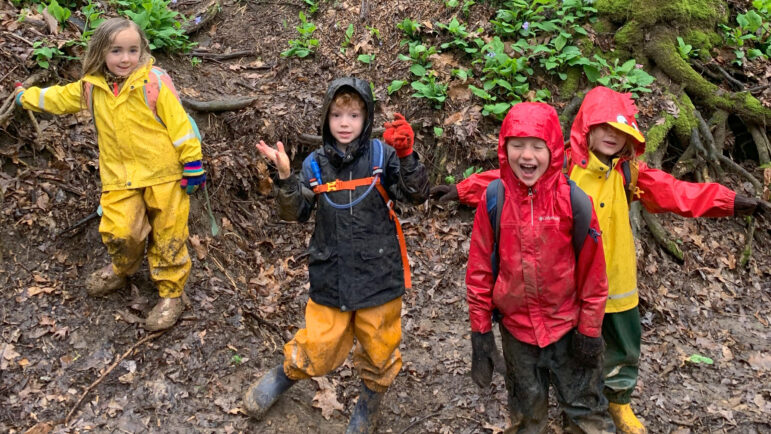
Callaway and Berry want to expand their school, but are limited by resources and policy restrictions. Because Little Mountain Forest School doesn’t have a building, it is not eligible to be licensed as a full time program in Alabama.
For now, they can only offer half-day classes, which is difficult for families who need full time child care. Plus, cost is always a barrier.
“One of our challenges is accessibility and equity,” Callaway said. “A lot of people are excluded unfortunately. So we’re looking at ways to rectify that, whether it’s more summer camps or an after school program or something to reach the kids who do spend more time indoors and sedentary.”
Nature education for everyone
Some environmental groups are also working to fill in this gap, offering outdoor-based learning opportunities to students at traditional schools.
The Cahaba River Society, a Birmingham-based non-profit, provides day-long canoe trips and stream walks that explore the biodiversity of the Cahaba River Watershed. The group’s education director La’Tanya Scott said it’s a rare experience for some kids.
“We have a lot of students that have never stepped foot in any kind of body of water,” Scott said. “I had a student that had never touched a tree before.”
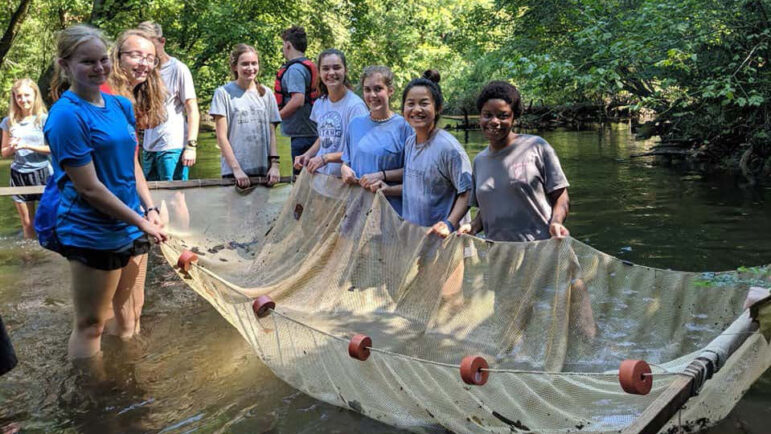
Cahaba River Society helps schools access financial aid to help cover the costs of the trips, which can include a $10 fee per student plus the cost of hiring substitute teachers and renting buses.
Still, there are other roadblocks. Some kids are afraid to spend the day near the river, worried about snakes and spiders, even lions and tigers. And some school officials are concerned about safety.
Scott said safety is a number one priority. The goal is to help kids feel confident exploring the outdoors.
“The sense of comfort and grounded-ness that you feel in nature, I feel like every student and every child, regardless of where you are from, should have that same opportunity,” Scott said.
During this summer’s Gross Out Camp, kids appeared to soak up the time spent outdoors.
“We get to go on hikes and stuff,” said eight-year-old camper Cecilia. “It’s basically like a field trip, and we get to go fishing.”
“You can’t do half the things at school that we’re doing now,” said 10-year-old Madeleine.
Nature educators acknowledge that it can be difficult to explore activities like fishing or hiking in a traditional classroom, but they say there are easy ways to introduce kids to the outdoors in that setting.
Teachers can use natural objects, like rocks and leaves, to teach about math and language. Another idea is to keep the lesson plan the same, and just move everything outside.
Do you have an idea worth featuring as part of our Outdoor Connections series? Email [email protected].
Supreme Court appears split in tax foreclosure case
At issue is whether a county can seize homeowners' residence for unpaid property taxes and sell the house at auction for less than the homeowners would get if they put their home on the market themselves.
Top House Dem wants Justice Department to explain missing Trump-related Epstein files
After NPR reporting revealed dozens of pages of Epstein files related to President Trump appear to be missing from the public record, a top House Democrat wants to know why.
ICE won’t be at polling places this year, a Trump DHS official promises
In a call with top state voting officials, a Department of Homeland Security official stated unequivocally that immigration agents would not be patrolling polling places during this year's midterms.
Cubans from US killed after speedboat opens fire on island’s troops, Havana says
Cuba says the 10 passengers on a boat that opened fire on its soldiers were armed Cubans living in the U.S. who were trying to infiltrate the island and unleash terrorism. Secretary of State Marco Rubio says the U.S. is gathering its own information.
Surgeon general nominee Means questioned about vaccines, birth control and financial conflicts
During a confirmation hearing, senators asked Dr. Casey Means about her current positions and her past statements on a range of public health issues.
Rock & Roll Hall of Fame 2026 shortlist includes Lauryn Hill, Shakira and Wu-Tang Clan
The shortlist also includes a 1990s pop diva, heavy metal pioneers and a legendary R&B singer and producer.

